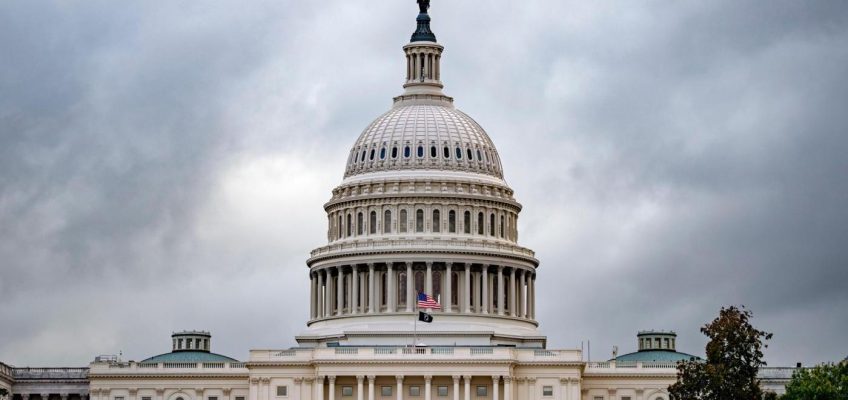The new development team—the third since the megaproject was announced in 2003—has agreed to pay $12 million as they plan a new way forward. A key advocate deemed that “insufficient” given the 876 unbuilt affordable apartments, which were supposed to be constructed by May 31.
Looking west from Vanderbilt Avenue near Atlantic Avenue in Brooklyn. The next phase of the project is expected to include six parcels on a platform to be built over the MTA’s Vanderbilt Yard. (Adi Talwar/City Limits)
Four months after the previous developer missed a deadline to deliver the remaining 876 affordable units in the long-stalled Atlantic Yards (aka Pacific Park) megaproject in Brooklyn, New York State endorsed a new development team, which agreed to pay limited penalties for the delayed apartments while a new plan—likely requesting valuable new bulk and public investment—for this key site percolates.
The emergence of a joint venture, involving the funding entity Cirrus Workforce Housing and the development firm LCOR, marks a third master developer and a new milestone in a star-crossed project. It was announced in December 2003, approved in 2006, and—after delays from a recession and lawsuits prompted renegotiation—re-approved in 2009.
While contentious from the start, the promised 2,250 below-market “affordable” units (of 6,430 total), were key to public support for Atlantic Yards; nearly 900 are yet to be constructed.
Eight residential towers and the Barclays Center arena have been built on the 22-acre parcel stretching east from the intersection of Atlantic and Flatbush avenues. Eight development parcels remain, six of them (known as sites B5-B10) relying on a costly platform to be built over the Metropolitan Transportation Authority’s (MTA) two-block Vanderbilt Yard, used to store and service Long Island Rail Road trains.
Previous master developer Greenland USA, the arm of a Shanghai-based company, lost control of the railyard sites after defaulting on $286 million in loans to immigrant investors under the EB-5 cash-for-visas program.
A look at current progress versus the approved plans for the project. Graphic by Ben Keel / Norman Oder.
The announcement that Cirrus, allied with New York’s building trades unions, and LCOR, known for building Terminal 4 at JFK Airport, qualifies as a “permitted developer” and had acquired railyard development rights via a foreclosure auction pending for nearly two years, came with new optimism from the state authority that oversees/shepherds the project.
“Under Governor [Kathy] Hochul’s leadership, ESD is determined to move this project forward in partnership with the permitted developer to engage the community and get to work,” said Empire State Development (ESD) CEO Hope Knight in an Oct. 7 press release circulated by Bolton-St. John’s, a lobbyist for Cirrus, an arm of Cirrus Real Estate Partners.
But an Oct. 9 meeting of the Atlantic Yards Community Development Corporation (AYCDC), established to oversee the project’s commitments, showed state officials and the new developers that frustration and distrust remain.
Penalties delayed
Starting June 1, Greenland was seemingly on the hook for about $1.75 million a month (or $2,000 per unit) due for the missing income-restricted affordable apartments. The deadline was established in 2014 for the project’s pledged 2,250 affordable units, part of a settlement with the BrooklynSpeaks coalition, which had threatened a lawsuit asserting that the delays raised fair-housing violations.
While advocates and local elected officials urged the state to enforce those penalties, ESD officials demurred, citing their goal to find a new master developer and warning that Greenland—which had claimed that state agencies delayed key approvals, allowing the valuable 421-a tax break to expire—had threatened to litigate.
Michelle de la Uz of the housing and community development group Fifth Avenue Committee, who as part of BrooklynSpeaks had negotiated the 2014 settlement, lamented that the unbuilt affordable housing was supposed to help stem the displacement of Black residents in the area, which was expected to accelerate.
“Those projections were spot on,” she said at last week’s meeting.
Michelle de la Uz of the housing nonprofit Fifth Avenue Committee, which in 2014 negotiated the May 2025 deadline for affordable housing, told the advisory group that the interim penalties negotiated by New York State were “insufficient.” (Photo by Norm Oder)
So the announced $12 million payment the new development team will make to a city housing trust fund, predicated on state approval of a new Atlantic Yards/Pacific Park plan, was “insufficient,” said de la Uz.
Former Brooklyn Community Board 8 member Diana Foster, a potential plaintiff in the threatened 2014 BrooklynSpeaks lawsuit who has since been priced out of the neighborhood, spoke with frustration during the public comment period.
“It would have been great to have aged out in my community,” she said, “and I’m not allowed to do that.”
The payment—$4.5 million in 30 days; $2.5 million by July 31, 2026; and the remainder upon that new plan—struck a balance between money now and progress with the new developers, said Anna Pycior, ESD’s senior vice president of community relations.
“The $12 million is hard to square against what was a much larger liability and a much greater need,” observed Gib Veconi, an AYCDC director who, as a leader of BrooklynSpeaks, launched a petition urging Hochul to enforce the penalties.
If the new plan runs aground, the damages could again accrue, but ESD aims for “a framework of new timelines, new deadlines, new enforcement tools,” said Arden Sokolow, executive vice president of real estate and planning.
This time it’s different?
Joseph McDonnell, Cirrus’ managing partner, at the meeting acknowledged the project’s rocky past, but asserted that this time it’s different, saying they see an opportunity to “make a dent in the housing crisis” in an era when “the easy sites” have evaporated.
“There aren’t that many projects of scale with this type of location, this type of transportation connectivity, and this type of neighborhood amenity around it,” McDonnell said.
Joseph McDonnell, managing partner of joint venture principal Cirrus Workforce Housing, said that their lower expected returns, alliance with the building trades, and discount on Greenland’s debt all made the project more feasible. (Photo by Norm Oder)
He cited “mission-driven equity,” not focused on the highest return, and a “true public-private partnership” involving the New York City Building and Construction Trades Council, whose pension funds support Cirrus projects and who will offer predictable costs via a project labor agreement. Cirrus emerged in March 2024 when New York City announced a Memorandum of Understanding to cooperate on workforce housing.
The developers, he said, are “making a long-term bet on New York City.”
“We’re not going to decide that it’s better to develop somewhere else,” he said. “It’s really what happened with Greenland in some respects.” (The city in July awarded LCOR-Cirrus the rights to build at the old Flushing Airport site. In May, Resorts World New York City, gunning for a full casino license, announced a joint venture with Cirrus to invest in up to 50,000 units of “workforce housing.”)
Also crucial: Cirrus’ ability to buy Greenland’s debt, presumably at a deep discount. “We see the ability to sort of make lemonade out of lemons,” McDonnell said, “and that the largest subsidy provider to this project is no doubt Greenland. They put $950 million into the ground, and they also built a railyard.”
Graphic by Ben Keel / Norman Oder.
The exact contours of Greenland’s total investment were not specified, though Greenland’s parent company has written off nearly $400 million on the project. Putting aside the $300 million in debt associated with the Brooklyn project, mostly owed to EB-5 investors, the remainder of Greenland USA’s debt totaled $200 million, the Real Deal reported.
Until early October, McDonnell said, “the various components of [Atlantic Yards] were encumbered by over $300 million of debt.” As part of the restructuring, “we reduced that debt by about 75 percent.”
That means that creditors such as the EB-5 investors, associated with the U.S. Immigration Fund, and Fortress Investment Group, which acquired some of that EB-5 debt, got deferred interest in the future railyard development.
“We came in to clean up the structure such that it can hopefully move forward at a quicker pace,” McDonnell said of the joint venture, which is called—in perhaps aspiration or portent—Brooklyn Ascending Land Co., LLC. The construction manager will be Plaza Construction, which previously worked on the project. Cirrus is also making a loan to settle Greenland’s debts with architects and engineers.
State officials expressed appreciation that the project’s under the control of a single developer, allowing them to consider it “holistically, with one development team and one process,” said Joel Kolkmann, ESD senior vice president of real estate and planning.
Then again, the reliance on a single developer—originally Forest City Ratner/Forest City Enterprises, later Greenland USA—added risk to a complex project, as BrooklynSpeaks has argued.
McDonnell said project details would depend on the total cost, which would be based on the “program and the density,” but “we’re confident we’ll get it done.”
Slides shared by Cirrus and LCOR at an Atlantic Yards Community Development Corporation meeting last week. (Screenshot)
Still, the fine print on Cirrus’ slides, presented at last week’s meeting, offered a standard disclaimer aimed at investors, noting that “no assurance can be given that such targets, intentions or expectations will be met.”
Complex sites, complex plan
“The railyard sites are not like any other sites in New York,” added Anthony Tortora, co-chief investment officer of LCOR, which is co-owned by the California State Teachers’ Retirement System. “They’re incredibly complex. Each of the six parcels present unique challenges and opportunities.”
LCOR, he said, has “extensive experience with transit oriented development involving complex sites.” (It recently launched the mixed-use project Hoboken Connect.)
“The current plan for the rail yards predates the iPhone,” he noted. (It emerged in January 2007.) “We think there’s an opportunity to optimize the plan, bring it current, which again will facilitate the delivery of more housing, more affordability, and more community benefits.”
The design, added McDonnell, could be “more contextual to the contours of what this community wants and needs today, I don’t think we need 40 Starbucks along Atlantic Avenue.” That seemed a stretch. The design guidelines, at street level, limit use to community facilities, retail and personal service, health clubs, and residential building spaces.
Still, Tortora acknowledged, “there’ll be trade-offs for sure.” Those await discussion in a community engagement process expected to start in mid-November, leading to a new memorandum of understanding with the state by March 1, 2026, or as late as July 31, 2026.
Asked about the expected public investment, McDonnell said it depends on the affordable housing income “bands” targeted, working with state and city agencies, as well as using tax abatements.
“I would think through the buildings it will actually vary quite a bit,” he said.
The Barclays Center arena and surrounding towers in downtown Brooklyn. (Adi Talwar/City Limits)
“The mission of Cirrus Workforce Housing is to responsibly build,” McDonnell added. “We use union labor [and build] housing across the income bands. We are not condo-focused.”
If that doesn’t rule out condos, that may leave the option to build more lucrative condos to make deeper affordability work.
Though Cirrus’s website doesn’t indicate any completed projects, McDonnell said they wouldn’t focus on smaller apartments: “When you look at the type of housing we build alongside public investment, the unit counts are much more skewed towards twos and threes.”
AYCDC Director Ron Shiffman, a veteran advocacy planner, said he appreciated the developers’ mission. However, he asked if they’d follow Related Companies’ effort to restart Hudson Yards by publicly financing the needed railyard platform, which prompted criticism from the Comptroller’s office. Under Greenland, no public support had been publicly proposed.
McDonnell didn’t say no. “Depending on the final program, there are various public sources available which support infrastructure like this,” he said, “at the city, state, and federal level. We’re fairly good at putting those things together.”
He noted that the foundations for the platform on the first block had begun “but kind of stopped halfway through.”
What’s next?
ESD has hired the firm Karp Strategies for a community engagement process, starting in mid-November, seeking feedback on issues of density, affordable housing, open space, the streetscape, and economic development.
It will start “with a presentation of where we stand, what has been built today,” said Pycior, “then explaining what the development team is proposing, not as a done deal, but as a thing to respond to.”
Two in-person meetings, as well as an online survey and other feedback, would culminate in a January Zoom meeting to take public comment on a draft public engagement report. Some AYCDC directors, however, suggested a third meeting before the Zoom; ESD officials said they’d consider that.
Veconi noted that, given the project’s decades-long history, they faced “engagement fatigue and some level of accountability concerns.” Asked how the plan could be credible, Kolkmann said ESD would “be coming to you with the plan and its viability, and we’ll explain how it’s being financed.”
BrooklynSpeaks has previously argued that proposed changes merit a third-party analysis of their financial feasibility.
The speed of construction remained unclear. McDonnell disavowed a quote from the U.S. Immigration Fund’s Nicholas Mastroianni II, who told the Real Deal the first platform phase would take five years.
Veconi observed that, based on conversations with ESD staff, a required environmental review of project changes might begin in July 2026 and take two years. After project approval, each block of the platform would take three years to build.
“If that number is still good, putting a building on top of them would probably take another couple years,” Veconi said. “So, it sounds like we’re probably into 2033.”
“Yeah, maybe that’s from past experience,” countered Kolkmann. “I think we have to go get the details of the plan and see what the team’s phasing and strategy looks like.”
Indeed, one previous platform plan suggests a separate, faster phase for the B5 site, just east of Sixth Avenue, which Greenland had designed and was preparing to build. A second phase would include the B6 and B7 sites, while a third would include B8 through B10, between Carlton and Vanderbilt avenues.
Only completion of that eastern block would allow completion of the 8-acre “Pacific Park,” since it relies on converting a closed block of Pacific Street into open space.
The development team might also target Site 5, the parcel catercorner to the Barclays Center, long home to the big-box stores Modell’s and P.C. Richard. It was approved for a 250-foot tower in 2006. Since 2016, the project developers have aimed to combine that bulk with that of the unbuilt B1, the flagship tower once slated to loom over the arena.
Indeed, in 2021, Greenland signed an interim lease with ESD, which agreed to support a transfer of the B1 rights across Flatbush Avenue to construct an even taller, bulkier project, supporting a tower 910 feet tall, the borough’s second tallest. It could contain housing, retail, a 550-room hotel, plus new LED signage, presumably valuable for advertising.
The Site 5 and B1 development was not part of the foreclosure; Greenland has a passive stake in that project, which, while not requiring a platform, could intersect with the Pacific Street entrance to the Atlantic Avenue-Barclays Center subway station.
Project backstory
Atlantic Yards was launched by veteran Brooklyn developer Forest City Ratner, which had bought the New Jersey Nets to leverage a new arena project in the nation’s media capital. Though generating pushback over scale, subsidies, the bypass of City Council, feared impacts, and the use of eminent domain, the project was approved by ESD (then known as Empire State Development Corporation) in 2006. The promised 2,250 below-market “affordable” units (of 6,430 total), were key to public support.
Forest City, which broke ground for the Barclays Center in 2010, opened it in September 2012, anchored by the Brooklyn Nets. A plan to build the entire residential project via modular construction ran aground. Forest City, aiming to reduce its exposure, in 2014 sold 70 percent of the remaining project to Greenland, excluding the arena and the troubled modular tower.
Before the Greenland deal was formalized, BrooklynSpeaks negotiated the new affordable housing timeline. The new partners built three towers before Forest City stalled the project in 2016, citing competition from Downtown Brooklyn towers and construction cost increases.
After Forest City exited almost completely in 2018, Greenland sold development leases to TF Cornerstone for two sites, to The Brodsky Organization for another, and built another with Brodsky.
“They never really intended to develop this themselves,” McDonnell asserted of Greenland. “They thought they were developing it with Forest City, and it atrophied from that time forward.” The actual path was more complicated.
Plans to develop the railyard sites, including the designed B5 tower, were stalled by the COVID-19 pandemic and negotiations with the ESD and MTA. Greenland in 2023 aimed to rescue the project by supersizing it, including selling the railyard development rights. But the EB-5 loans were overdue, and the U.S. Immigration Fund began pursuing foreclosure in November 2023.
However, only a new permitted developer—one with a decade of experience in large-scale projects—could take over. Hudson Yards developer Related last year pursued the platform sites, but pulled out, for reasons unexplained. Cirrus soon emerged, then allied with LCOR.
What about the arena?
The project, proposed by a single developer, now has many players. A crucial shift was the sale of the Nets and the arena company, in stages, by Forest City to Russian oligarch Mikhail Prokhorov, thus precluding the opportunity to cross-subsidize the project.
In 2017, Prohorov began a sale, completed in 2019, to the Alibaba billionaire Joe Tsai, who operates holding company BSE Global. Both Prokhorov and Tsai have made large profits. (Tsai, who last year sold a 15 percent slice in BSE Global at a $5.8 billion valuation, and since sold a slice in the New York Liberty, which he and his wife Clara Wu Tsai purchased for a song and rebuilt—at a $450 million valuation.)
Site 5, long home to Modell’s and P.C. Richard, is slated for a two-tower development, with one tower rising potentially 910 feet tall. In the interim, BSE Global, which operates the Barclays Center and owns the Brooklyn Nets and New York Liberty, has opened a youth basketball training center. (Photo by Norm Oder)
BSE Global has begun to pursue an “ecosystem” of media and events, buying Brooklyn Magazine (now BK MAG), starting the pop culture site Type.Set.Brooklyn, buying the retail condo at the Williamsburgh Savings Bank tower, planning a hotel, and launching the Planet Brooklyn music festival.
Last month, BSE Global opened the Brooklyn Basketball Training Center, offering after-school and weekend youth programs (for $520/8 hours), in the long-closed Modell’s store. While the training center won’t be permanent, BSE may seek space in the future development at Site 5, which could include a hotel.
Assuming the Site 5 development plan proceeds, BSE Global, though not a party to it, would gain by avoiding construction of the flagship tower that would eliminate the Barclays plaza, now sponsored by Ticketmaster, and interfere with arena operations and promotion.
At the Oct. 9 meeting, Veconi encouraged ESD to get BSE Global involved in project discussions, given that issues like streetscape improvements inevitably involve the arena. Shiffman added that the arena operator should compensate the public for use of the plaza.
Veconi agreed. The agreement to move the unbuilt tower’s bulk across Flatbush Avenue to Site 5, he said, was a “backroom deal.”
“If that’s what’s happening,” Veconi said, “we need a give-back from the arena. They’re getting something that they weren’t going to have before, and has value.”
To reach the editor, contact Jeanmarie@citylimits.org. Want to republish this story? Find City Limits’ reprint policy here.
The post New Development Team Promises Atlantic Yards Progress, But Housing Penalties Called ‘Insufficient’ appeared first on City Limits.




